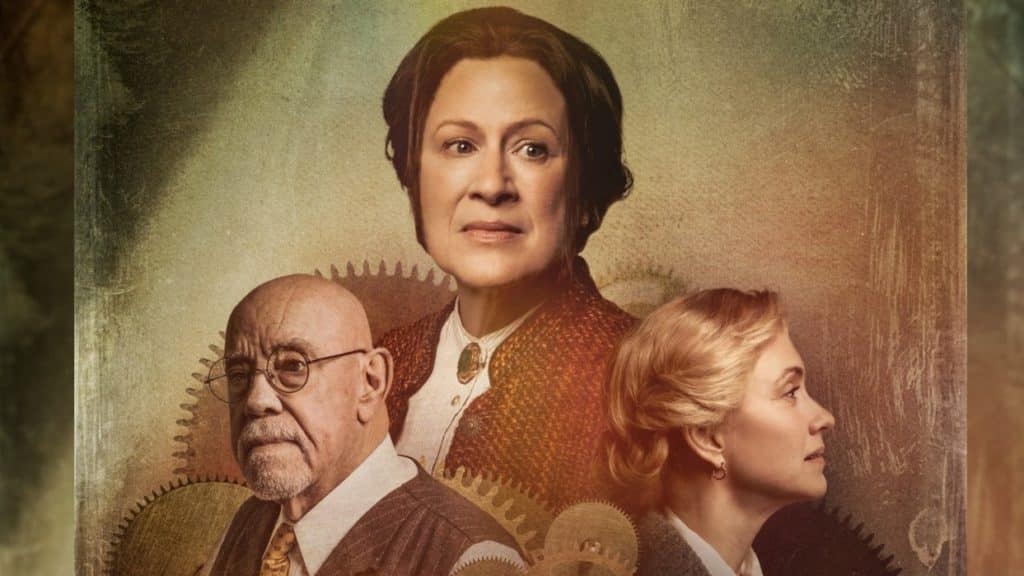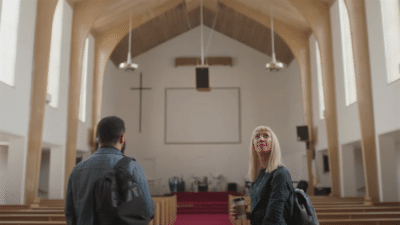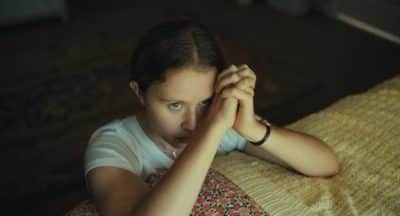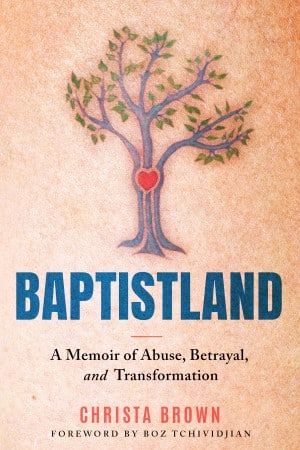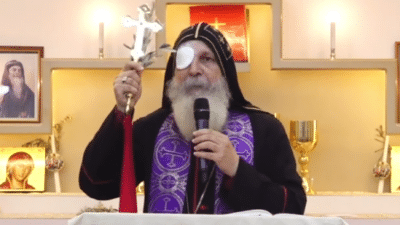Editor’s note: This past week, a filmed stage adaptation of “The Hiding Place” debuted in theaters and reached the Top 10 at the national box office. This review examines how this version has reinterpreted the harrowing World War II story for today’s audiences.
“The Hiding Place” tells the true story of Corrie ten Boom, who with her sister, Betsie, and her father helped over 800 Jews escape capture in Nazi Germany by hiding them in their home before being arrested by the Nazis themselves and put into a concentration camp.
“The Hiding Place” is as harrowing and moving as you’d expect, both if you’ve never heard Corrie’s story before or if you know everything about it. It’s rightly often told and retold in Western and Christian circles, given the heroic act against one of the greatest evils of the modern world and the way in which Corrie spoke of how her faith helped her to love and forgive her enemies after the war ended.
This iteration is performed on stage and released in theaters by a collaboration between Rabbit Room Theatre, Matt Logan Productions and MA2LA, in partnership with Trafalgar Releasing. The Rabbit Room is an organization inspired by C.S. Lewis and J.R.R. Tolkien’s Inklings and founded (in part by Andrew Peterson, author of the beloved children’s fantasy book series “The Wingfeather Saga”) to be a modern creative Christian community to support artistic expression of the Christian faith and culture.
The play itself is an adaptation of Corrie ten Boom’s memoirs of her experiences, published in 1972, and the 1975 film adaptation of the same name.
Your tax-deductible gift helps our journalists report the truth and hold Christian leaders and organizations accountable. Give a gift of $30 or more to The Roys Report this month, and you will receive a copy of “Baptistland: A Memoir of Abuse, Betrayal, and Transformation” by Christa Brown. To donate, click here.
A.S. “Pete” Peterson, also co-founder, spoke to The Rabbit Room about the challenges of adapting Corrie’s work:
In the 50 years since she told her story, there’s not been another retelling of it. In a sense, the generation that fell in love with Corrie Ten Boom as she traveled the world and as people watched the movie and read her book, that generation is in their sixties and seventies and eighties now. They love her desperately but there’s another generation that would say, “Corrie, who?” So I think it’s a privilege for me to take the impact of that story and hopefully deliver it to a new generation because it’s not a story I think should be forgotten. I think Corrie is one of the heroes of the faith in a capital letter kind of way. We’re on the verge of maybe forgetting that.
Writing about a play filmed and put on the big screen is always tricky because you are really reviewing two works of art at once. You are reviewing the play, which was made to be seen in person, and you are reviewing the movie they made by filming the play. These are two different artistic mediums, and each choice made is made with its own experience in mind, and they frequently come into conflict with each other.
For example, a play is made to show everything on stage at once, so everything on stage is a part of the “scene” that works together to say what it wants to say to the audience. Meanwhile, movies do this by what they keep in the shot, whether that’s a shot of the full set or a close up on the character’s face. So when a movie does a close up of a play, they are in a sense violating the experience that the play was built to give.
That said, sometimes the hybrid of theater and film works and can create a new experience that is different but equal to what the experience would have been in its original intent. The filmed version of “Hamilton” on Disney+ falls under this category. There is a scene in “The Hiding Place” where Betsie is distracting Otto, the Nazi officer, while their Jewish guests are hiding under the table.
In the play, you can see the Jewish family the whole time. So you are instantly filled with tension as to what’s going to happen. In the film, the shot obscures the Jews at first, so you are left seeing the scene the way the Nazi officer is, until a moment later the camera reveals the refugees hiding, and our view of the scene instantly changes. It’s a subtle bit of direction, but it layers the experience.
Other times the transfer from stage to screen is less effective. There is a moment of mental chaos for Corrie when she is going through moments of her past. In the play, she stumbles through moments of her past by spinning the set around and stumbling through the sets.
In the film, our view is warped with blurs, close-ups, cuts and Dutch angles — which are less aesthetically pleasing — and feels overcrowded because we can still see the set she’s walking through behind all of that smoke and mirrors. In this case, the mediums are stepping on each other’s toes instead of complimenting each other.
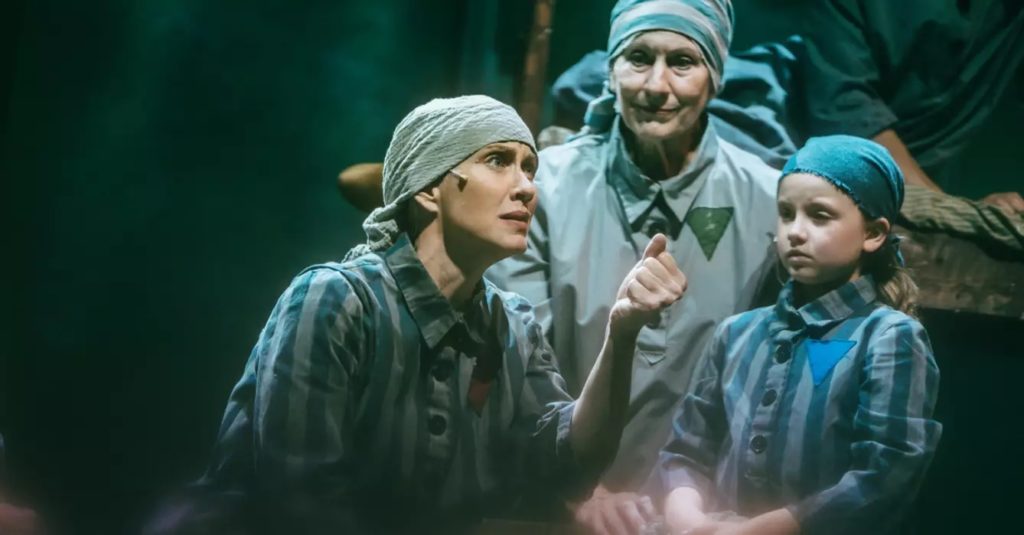
One of the striking things about “The Hiding Place” is just how Christian it is. Typically in biopics about famous people, even those who are explicitly Christian, their faith is downplayed. Corrie and her family constantly talk about God and faith, whether it’s during a normal part of their family life, when they’re in the fires of the concentration camp, or when Corrie must find a way to interpret her experiences and how to love and forgive post-Holocaust.
These Christian parts of Corrie and her story are not referenced but then abstracted into more vague principles like “love” and “forgiveness.” Corrie and her family talk about God explicitly and regularly like my family did. Through Otto, the Nazi evil is framed — accurately, according to history — as an explicit rejection of and replacement for Christianity. When Corrie talks about what gives her the power to forgive, she explicitly credits a “who” — that “who” being Jesus.
This is even more impressive because of how purposefully the play was made not to alienate non-Christians, Peterson said:
One of the key things to remember is that when Corrie wrote the book and when the original film came out was in the ‘70s. Our culture was in a very different place as it relates to religion and especially Christianity. I mean, Christianity was the water that everyone swam in all of the time. People spoke the language whether they went to church or not, so that story was told in a way that was very Christian, very church-like, very Christian-ese. For better or worse, that language is much harder to hear by the culture at large because there’s so much freight attached to that way of talking about what we believe.
One of our challenges going into it, because I wanted Corrie’s story to continue for another generation, was that we had to figure out a way to tell her story in a way that would open up the ears of those who don’t believe what I believe. One of my challenges to the folks we were making it with was that if we can’t present this show to a general audience in a way that they can enjoy and get the message out of it in the same way that I, as a Christian, can, then I don’t know if we will have achieved our goal to create something that can perpetuate for another generation.
The story is not without its flaws. It does suffer from pacing issues that make it feel more like a series of bad things one after the other with no end rather than a story heading somewhere, which makes some of the beats feel repetitive and cause one to look at their watch rather than feel it in the moment.
Likewise, the ending of the story as told by Peterson will rightly be divisive. Without giving too much away, they do change the context for Corrie’s most radical act of forgiveness — one of the most famous stories of forgiveness that has been told and retold by Christian pastors countless times and therefore that a lot of Christians are very familiar with — in a way that many would argue (and I’m one of them) makes it weaker.
On the other hand, the film does create a brilliant visual motif (which, again, I won’t spoil) that allows it to show visually how Corrie describes God giving her the ability to forgive when she couldn’t do it herself. Describing spiritual realities visually is really hard and rarely well done, so coming up with that motif and executing it that well is really praiseworthy.
All in all, if you want to be reminded of what great evil and great good and great forgiveness look like, the story of Corrie ten Boom is one of the best. And this is as worthy a version of the story as I have ever seen.
“The Hiding Place” is now playing in theaters thru August 17.
This article originally appeared at Religion Unplugged.
Joseph Holmes is an award-nominated filmmaker and culture critic living in New York City. He is co-host of the podcast The Overthinkers, where he discusses art, culture and faith with his fellow overthinkers.




